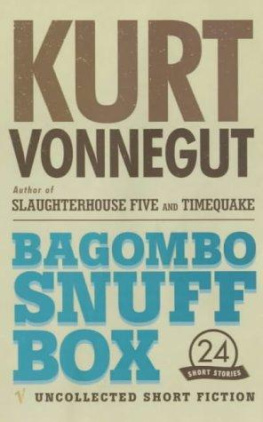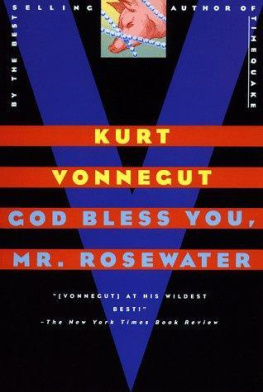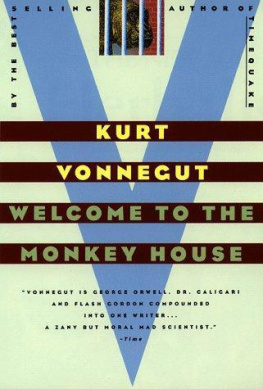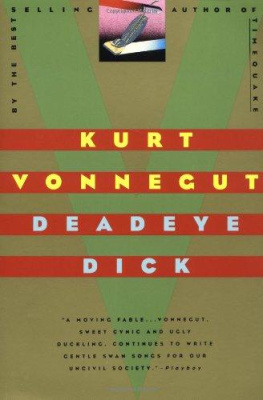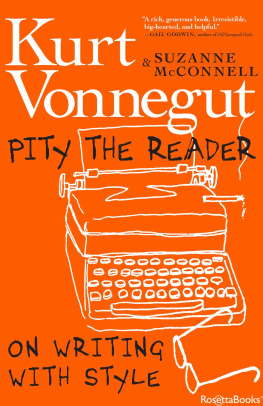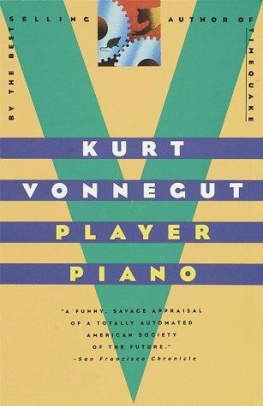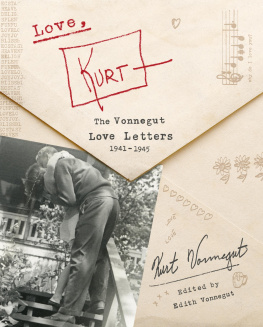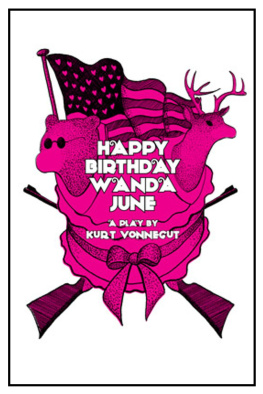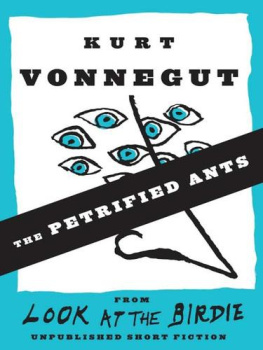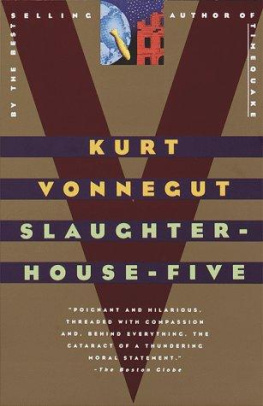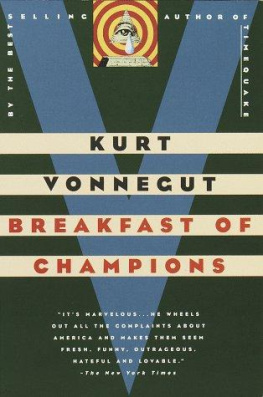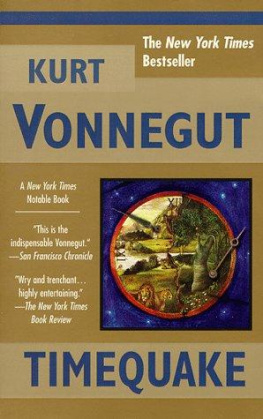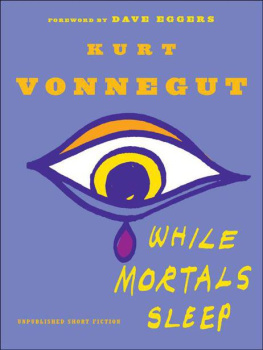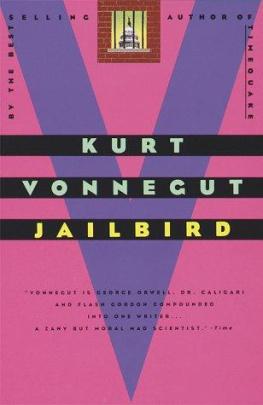Kurt Vonnegut - Bagombo Snuff Box: Uncollected Short Fiction
Here you can read online Kurt Vonnegut - Bagombo Snuff Box: Uncollected Short Fiction full text of the book (entire story) in english for free. Download pdf and epub, get meaning, cover and reviews about this ebook. year: 2000, publisher: Berkley Trade, genre: Detective and thriller. Description of the work, (preface) as well as reviews are available. Best literature library LitArk.com created for fans of good reading and offers a wide selection of genres:
Romance novel
Science fiction
Adventure
Detective
Science
History
Home and family
Prose
Art
Politics
Computer
Non-fiction
Religion
Business
Children
Humor
Choose a favorite category and find really read worthwhile books. Enjoy immersion in the world of imagination, feel the emotions of the characters or learn something new for yourself, make an fascinating discovery.
- Book:Bagombo Snuff Box: Uncollected Short Fiction
- Author:
- Publisher:Berkley Trade
- Genre:
- Year:2000
- Rating:4 / 5
- Favourites:Add to favourites
- Your mark:
- 80
- 1
- 2
- 3
- 4
- 5
Bagombo Snuff Box: Uncollected Short Fiction: summary, description and annotation
We offer to read an annotation, description, summary or preface (depends on what the author of the book "Bagombo Snuff Box: Uncollected Short Fiction" wrote himself). If you haven't found the necessary information about the book — write in the comments, we will try to find it.
Bagombo Snuff Box: Uncollected Short Fiction — read online for free the complete book (whole text) full work
Below is the text of the book, divided by pages. System saving the place of the last page read, allows you to conveniently read the book "Bagombo Snuff Box: Uncollected Short Fiction" online for free, without having to search again every time where you left off. Put a bookmark, and you can go to the page where you finished reading at any time.
Font size:
Interval:
Bookmark:
Kurt Vonnegut
v1.1. Fixed line breaks, chapter headings.
These stories, and twenty-three of similar quality in myprevious hardcover collection, Welcome to the Monkey House, were written atthe very end of a golden age of magazine fiction in this country. For about fiftyyears, until 1953, say, stories like these were a mild but popular form of entertainmentin millions of homes, my own included.
This old mans hope has to be that some of his earliesttales, for all their mildness and innocence and clumsiness, may, in thesecoarse times, still entertain.
They would not be reprinted now, if novels I had writtenaround the same time had not, better late than never, received criticalattention. My children were adults by then, and I was middle-aged. Thesestories, printed in magazines fat with fiction and advertising, magazines nowin most cases defunct, were expected to be among the living about as long asindividual lightning bugs.
That anything I have written is in print today is due to theefforts of one publisher, Seymour Sam Lawrence (1927-1994). When I was brokein 1965, and teaching at the Writers Workshop at the University of Iowa allalone, completely out of print, having separated myself from my family on CapeCod in order to support them, Sam bought rights to my books, for peanuts, frompublishers, both hardcover and softcover, who had given up on me. Sam thrust mybooks back into the myopic public eye again.
CPR! Cardiopulmonary resuscitation of this author who wasall but dead!
Thus encouraged, this Lazarus wrote Slaughterhouse-Fivefor Sam. That made my reputation. I am a Humanist, and so am not entitled to expectan afterlife for myself or anyone. But at Seymour Lawrences memorial serviceat New York Citys Harvard Club five years ago, I said this with all my heart: Samis up in Heaven now. I returned to Dresden, incidentally, the setting for Slaughterhouse-Five,on October 7th, 1998. I was taken down into the cellar where I and about ahundred other American POWs survived a firestorm that suffocated or incinerated135,000 or so other human beings. It reduced the Florence of the Elbe to ajagged moonscape.
While I was down in that cellar again, this thought came tome: Because I have lived so long, I am one of the few persons on Earth whosaw an Atlantis before it disappeared forever beneath the waves.
Short stories can have greatness, short as they have to be.Several knocked my socks off when I was still in high school. Ernest HemingwaysThe Short Happy Life of Francis Macomber and Sakis The Open Window and O.Henrys The Gift of the Magi and Ambrose Bierces An Occurrence at Owl CreekBridge spring to mind. But there is no greatness in this or my other collection,nor was there meant to be.
My own stories may be interesting, nonetheless, as relicsfrom a time, before there was television, when an author might support a familyby writing stories that satisfied uncritical readers of magazines, and earningthereby enough free time in which to write serious novels. When I became afull-time free-lance in 1950,1 expected to be doing that for the rest of mylife.
I was in such good company with a prospectus like that. Hemingwayhad written for Esquire, F. Scott Fitzgerald for The Saturday EveningPost, William Faulkner for Colliers, John Steinbeck for TheWomans Home Companion.
Say what you want about me, I never wrote for a magazinecalled The Womans Home Companion, but there was a time when I wouldhave been most happy to. And I add this thought: Just because a woman is stuckalone at home, with her husband at work and her kids at school, that doesntmean she is an imbecile.
Publication of this book makes me want to talk about the peculiarand beneficial effect a short story can have on us, which makes it different froma novel or movie or play or TV show. If I am to make my point, though, you mustfirst imagine with me a room in the home of my childhood and youth inIndianapolis, in the middle of the previous Great Depression. The previousGreat Depression comprised from the stock market crash on October 24th, 1929, untilthe Japanese did us the favor, for the sheer hell of it, of bombing ourcomatose fleet of warships in Pearl Harbor, on December 7th, 1941. The littleyellow bastards, as we used to call them, were bored to tears with the GreatDepression. So were we.
Imagine that it is 1938 again, I am sixteen again. I comehome again from yet another lousy day at Shortridge High School. Mother, whodoes not work outside the home, says there is a new Saturday Evening Post onthe coffee table. It is raining outside, and I am unpopular. But I cant turnon a magazine like a TV set. I have to pick it up, or it will go on lyingthere, dead as a doornail. An unassisted magazine has no get-up-and-go.
After I pick it up, I have to make all one hundred sixtypounds of male adolescent meat and bones comfortable in an easy chair. Then Ihave to leaf through the magazine with my fingertips, so my eyes can shop for astory with a stimulating title and illustration.
Illustrators during the golden age of American magazinefiction used to get as much money as the authors whose stories they illustrated.They were often as famous as, or even more famous than, the authors. NormanRockwell was their Michelangelo.
While I shop for a story, my eyes also see ads forautomobiles and cigarettes and hand lotions and so on. It is advertisers, notreaders, who pay the true costs of such a voluptuous publication. And God blessthem for doing that. But consider the incredible thing I myself have to do inturn. I turn my brains on!
That isnt the half of it. With my brains all fired up, I dothe nearly impossible thing that you are doing now, dear reader. I make senseof idiosyncratic arrangements, in horizontal lines, of nothing but twenty-sixphonetic symbols, ten Arabic numerals, and perhaps eight punctuation marks, ona sheet of bleached and flattened wood pulp!
But get this: While I am reading, my pulse and breathingslow down. My high school troubles drop away. I am in a pleasant statesomewhere between sleep and restfulness.
OK?
And then, after however long it takes to read a short story,ten minutes, say, I spring out of the chair. I put The Saturday Evening Postback on the coffee table for somebody else.
OK?
So then my architect dad comes home from work, or morelikely from no work, since the little yellow bastards havent bombed PearlHarbor yet. I tell him I have read a story he might enjoy. I tell him to sit inthe easy chair whose cushion is still dented and warmed by my teenage butt.
Dad sits. I pick up the magazine and open it to the story.Dad is tired and blue. Dad starts to read. His pulse and breathing slow down.His troubles drop away, and so on.
Yes! And our little domestic playlet, true to life in the1930s, dear reader, proves exactly what? It proves that a short story, becauseof its physiological and psychological effects on a human being, is moreclosely related to Buddhist styles of meditation than it is to any other formof narrative entertainment.
What you have in this volume, then, and in every other collectionof short stories, is a bunch of Buddhist catnaps.
Reading a novel, War and Peace, for example, is nocatnap. Because a novel is so long, reading one is like being married foreverto somebody nobody else knows or cares about. Definitely not refreshing!
Oh sure, we had radios before we had TV But radios canthold our attention, cant take control of our emotions, except in times ofwar. Radios cant make us sit still. Unlike print and plays and movies and boobtubes, radios dont give us anything for our restless eyes to do.
Listen: After I came home from World War Two, a brevet corporaltwenty-two years old, I didnt want to be a fiction writer. I married mychildhood sweetheart Jane Marie Cox, also from Indianapolis, up in Heaven now,and enrolled as a graduate student in the Anthropology Department of theUniversity of Chicago. But I didnt want to be an anthropologist, either. Ionly hoped to find out more about human beings. I was going to be a journalist!
Font size:
Interval:
Bookmark:
Similar books «Bagombo Snuff Box: Uncollected Short Fiction»
Look at similar books to Bagombo Snuff Box: Uncollected Short Fiction. We have selected literature similar in name and meaning in the hope of providing readers with more options to find new, interesting, not yet read works.
Discussion, reviews of the book Bagombo Snuff Box: Uncollected Short Fiction and just readers' own opinions. Leave your comments, write what you think about the work, its meaning or the main characters. Specify what exactly you liked and what you didn't like, and why you think so.

